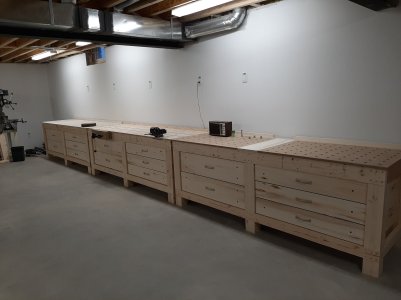smorgasbord
Member
- Joined
- Jan 7, 2022
- Messages
- 1,234
Other than "Don't do it!" that is.
There's a non-zero chance that we'll move - the first time in 33 years if we do it this year (but probably not this year). My previous "shop" was just some hand tools and a tablesaw. It's quite a different situation now: I've got a 2-car garage stuffed to the gills, plus a bunch of wood storage in the rafters. Big tools like a cabinet saw, 350mm jointer/planer, 540mm bandsaw, 25" dual drum sander, and 3HP cyclone dust collector are pretty straightforward, although I'll need help from strong movers and probably a lift gate truck. I'm not as young/strong as I once was. Packing up my CNC won't be fun, either - maybe I just try to sell it locally.
I guess I'm mostly concerned about all the medium/little things. Stuff in drawers, stuff on shelves, stuff hanging on the walls. While I poo-poo-ed using systainers in a shop, I have to admit that would/will help with moving items in them. I've got router bits in racks (aka long wood blocks with holes drilled in them) that I wouldn't trust on a drive, finishing liquids, etc.
And @jeffinsgf, I'll be sure to remember to take my air cleaner off the rafters, along with the spare ducting and some long board storage up there.
Some specific questions:
• Packing Time - how long should I allocate for packing up the shop to be "truck ready?" This would be mostly just me doing it.
• A "Pod" is an interesting idea, but I've read horror stories about how those get transported - seems like everything inside needs to be braced for very rough handling.
• Maybe I try creating a staging area and as I box/crate things up, place them in the staging area so loading of the truck can be done by many people and fairly quickly.
• One realtor told me I should prepare "a dollar figure" in case the potential house buyer asks about buying the whole shop en masse. He said similar things have happened in his office before. I'd have to pull some of my precious/discontinued hand tools out beforehand, though. That exercise, however, might be something I start today just to have an inventory of everything I've got and be useful for insurance purposes as well.
• Do I have to crate up the big tools? They all have all sorts of ways they can be tied to truck walls. I'm mostly worried about the jointer/planer since the jointer tables stick out so far and removing them would be a huge pain, not to mention reattaching and re-aligning them after, but maybe that's safest?
Any shop moving tales of woe or "it wasn't that bad" appreciated. And, maybe we won't move after all, but...
There's a non-zero chance that we'll move - the first time in 33 years if we do it this year (but probably not this year). My previous "shop" was just some hand tools and a tablesaw. It's quite a different situation now: I've got a 2-car garage stuffed to the gills, plus a bunch of wood storage in the rafters. Big tools like a cabinet saw, 350mm jointer/planer, 540mm bandsaw, 25" dual drum sander, and 3HP cyclone dust collector are pretty straightforward, although I'll need help from strong movers and probably a lift gate truck. I'm not as young/strong as I once was. Packing up my CNC won't be fun, either - maybe I just try to sell it locally.
I guess I'm mostly concerned about all the medium/little things. Stuff in drawers, stuff on shelves, stuff hanging on the walls. While I poo-poo-ed using systainers in a shop, I have to admit that would/will help with moving items in them. I've got router bits in racks (aka long wood blocks with holes drilled in them) that I wouldn't trust on a drive, finishing liquids, etc.
And @jeffinsgf, I'll be sure to remember to take my air cleaner off the rafters, along with the spare ducting and some long board storage up there.
Some specific questions:
• Packing Time - how long should I allocate for packing up the shop to be "truck ready?" This would be mostly just me doing it.
• A "Pod" is an interesting idea, but I've read horror stories about how those get transported - seems like everything inside needs to be braced for very rough handling.
• Maybe I try creating a staging area and as I box/crate things up, place them in the staging area so loading of the truck can be done by many people and fairly quickly.
• One realtor told me I should prepare "a dollar figure" in case the potential house buyer asks about buying the whole shop en masse. He said similar things have happened in his office before. I'd have to pull some of my precious/discontinued hand tools out beforehand, though. That exercise, however, might be something I start today just to have an inventory of everything I've got and be useful for insurance purposes as well.
• Do I have to crate up the big tools? They all have all sorts of ways they can be tied to truck walls. I'm mostly worried about the jointer/planer since the jointer tables stick out so far and removing them would be a huge pain, not to mention reattaching and re-aligning them after, but maybe that's safest?
Any shop moving tales of woe or "it wasn't that bad" appreciated. And, maybe we won't move after all, but...

